The engine fixture market is likely to grow from USD 1,250 million in 2025 to USD 1,815 million by 2035 reflects sustained demand for precision fixturing solutions across light vehicle manufacturing, commercial vehicle production, aerospace turbine assembly, and industrial engine facilities.
The initial five-year period (2025-2030) will see the engine fixture market advance from USD 1,250 million to approximately USD 1,480 million, adding USD 230 million in value, representing 41% of the total forecast expansion. This phase will be characterized by automotive sector investment in assembly line modernization, particularly in electric vehicle transition programs requiring new fixturing infrastructure, and aerospace manufacturers expanding turbine engine production capacity. Assembly fixtures and machining fixtures will capture the majority of procurement budgets as manufacturers prioritize production accuracy and throughput optimization.
The subsequent period (2030-2035) will witness growth from USD 1,480 million to USD 1,815 million, contributing USD 335 million or 59% of the decade's expansion. This phase will be defined by broader adoption of electro-mechanical actuation systems, integration with Industry 4.0 manufacturing platforms, and expansion across commercial vehicle and industrial engine segments. Market dynamics will shift toward comprehensive fixturing systems offering real-time monitoring capabilities, adaptive clamping functions, and compatibility with automated production environments. The trajectory indicates fundamental changes in how manufacturers approach engine assembly precision and quality control, with participants positioned to benefit from sustained investment across multiple engine types and manufacturing applications.
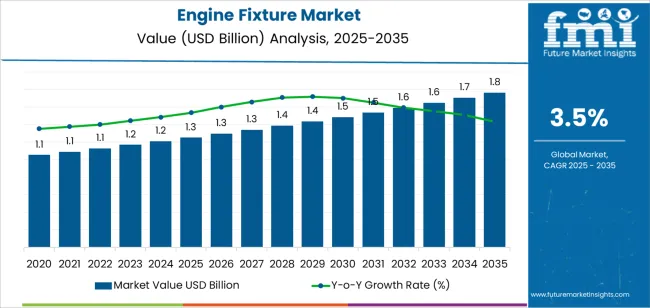
The Engine Fixture market demonstrates distinct growth phases with varying manufacturing dynamics and competitive characteristics. Between 2025 and 2030, the engine fixture market progresses through its automation adoption phase, expanding from USD 1,250 million to USD 1,480 million with steady annual increments averaging 3.8% growth. This period showcases the transition from basic fixturing configurations to advanced hydraulic and electro-mechanical systems with integrated monitoring capabilities and automated clamping functions becoming standard features in automotive and aerospace manufacturing facilities.
The 2025-2030 phase adds USD 230 million to market value, representing 41% of total decade expansion. Market maturation factors include standardization of automotive assembly protocols, declining component costs for hydraulic actuation systems, and increasing manufacturer awareness of precision fixturing benefits reaching 95% assembly accuracy in light vehicle and turbine engine applications. Competitive landscape evolution during this period features established fixturing manufacturers like Haas Automation and CIMSYSTEMS expanding their product portfolios while specialty providers focus on aerospace-grade fixture development and advanced clamping technologies.
From 2030 to 2035, market dynamics shift toward comprehensive system integration and emerging market expansion, with growth continuing from USD 1,480 million to USD 1,815 million, adding USD 335 million or 59% of total expansion. This phase transition centers on electro-mechanical actuation systems, integration with digital manufacturing platforms, and deployment across diverse commercial vehicle and industrial engine scenarios, becoming standard rather than specialized applications. The competitive environment matures with focus shifting from basic fixturing capability to comprehensive quality management systems and integration with production monitoring infrastructure.
| Metric | Value |
|---|---|
| Market Value (2025) | USD 1,250 million |
| Market Forecast (2035) | USD 1,815 million |
| Growth Rate | 3.8% CAGR |
| Leading Technology | Assembly Fixtures Type |
| Primary Application | Automotive OEM End Customer Segment |
The engine fixture market demonstrates solid fundamentals with assembly fixtures capturing a dominant 30% share through advanced precision control and production optimization capabilities. Automotive OEM applications drive primary demand with 40% market share, supported by increasing vehicle production volumes and precision assembly technology requirements. Geographic expansion remains concentrated in developed manufacturing markets with established automotive infrastructure, while emerging economies show accelerating adoption rates driven by vehicle production capacity expansion and rising quality standards.
Market expansion rests on three fundamental shifts driving adoption across automotive, aerospace, and industrial engine manufacturing sectors. First, manufacturing precision requirements create compelling operational advantages through engine fixtures that provide immediate quality improvement and production consistency without compromising assembly speed, enabling manufacturers to meet stringent dimensional tolerances while maintaining line throughput and reducing scrap rates. Second, automotive production modernization accelerates as vehicle manufacturers worldwide seek advanced fixturing systems that complement robotic assembly processes, enabling precise positioning control and repeatability that align with lean manufacturing standards and defect reduction goals.
Third, aerospace turbine production enhancement drives adoption from aircraft engine manufacturers and MRO facilities requiring effective clamping solutions that maximize component accessibility while maintaining positional accuracy during machining and testing operations. However, growth faces headwinds from capital cost challenges that vary across fixture suppliers regarding the integration of hydraulic and electro-mechanical actuation systems, which may limit adoption in cost-sensitive production environments. Technical limitations persist regarding setup complexity and changeover time requirements that may reduce effectiveness in high-mix manufacturing scenarios, affecting production flexibility and batch size optimization.
The engine fixture market represents a specialized yet critical manufacturing opportunity driven by expanding global vehicle production, aerospace turbine capacity increases, and the need for superior assembly precision in diverse engine manufacturing applications. As manufacturers worldwide seek to achieve 0.01mm positional accuracy, reduce assembly defects, and integrate advanced fixturing systems with automated platforms, engine fixtures are evolving from basic holding devices to sophisticated positioning solutions ensuring production quality and operational efficiency.
The engine fixture market's growth trajectory from USD 1,250 million in 2025 to USD 1,815 million by 2035 at a 3.8% CAGR reflects fundamental shifts in manufacturing quality requirements and assembly precision optimization. Geographic expansion opportunities are particularly pronounced in China and emerging Asian markets, while the dominance of assembly fixtures and automotive OEM applications provides clear strategic focus areas.
Strengthening the dominant assembly fixture segment (30% market share) through enhanced positioning accuracy, modular design integration, and automated clamping systems. This pathway focuses on optimizing fixture rigidity, improving accessibility configurations, extending operational effectiveness to 0.01mm repeatability, and developing specialized designs for electric vehicle powertrain applications. Market leadership consolidation through advanced engineering capabilities and production scalability enables premium positioning while defending competitive advantages against standardized solutions. Expected revenue pool: USD 95-125 million
Rapid automotive and aerospace production growth across China (5% CAGR) creates substantial expansion opportunities through local manufacturing capabilities and technology transfer partnerships. Growing vehicle production volumes and government manufacturing upgrade initiatives drive sustained demand for advanced fixture systems. Localization strategies reduce import costs, enable faster technical support, and position companies advantageously for OEM procurement programs while accessing the world's largest automotive manufacturing market. Expected revenue pool: USD 85-115 million
Expansion within the dominant automotive OEM segment (40% market share) through specialized fixture designs addressing light vehicle assembly standards and high-volume production requirements. This pathway encompasses automated line integration, quality monitoring capabilities, and compatibility with diverse powertrain architectures including electric vehicle platforms. Premium positioning reflects superior dimensional accuracy and comprehensive production efficiency support for modern automotive manufacturing. Expected revenue pool: USD 75-105 million
Strategic dominance of the hydraulic clamping segment (36% market share) requires enhanced force control capabilities and precision actuation addressing heavy-duty manufacturing requirements. This pathway addresses high-tonnage clamping applications, force monitoring integration, and commercial vehicle assembly operations with advanced hydraulic control systems. Premium pricing reflects superior clamping consistency and extended durability in demanding production environments. Expected revenue pool: USD 70-95 million
Development of specialized fixture solutions for aerospace turbine engines (22% market share) addressing precision machining, testing protocols, and MRO operational requirements. This pathway encompasses temperature-controlled fixtures, vibration isolation designs, and aerospace certification compliance with advanced engineering for demanding tolerance standards. Technology differentiation through aerospace-grade specifications enables diversified revenue streams while reducing dependency on automotive sector volatility. Expected revenue pool: USD 60-85 million
Expansion of electro-mechanical systems (24% market share) through servo-driven precision control, digital integration capabilities, and Industry 4.0 compatibility. This pathway encompasses force feedback monitoring, adaptive clamping algorithms, and smart manufacturing platform integration. Market development through advanced mechatronics enables differentiated positioning while accessing premium manufacturing facilities requiring data-driven quality control. Expected revenue pool: USD 55-75 million
Strategic engagement with tier-1 suppliers and specialized engine builders (30% market share) through customized fixturing solutions, technical collaboration programs, and long-term partnership development. This pathway encompasses rapid prototyping services, application engineering support, and co-development initiatives. Channel expansion through specialized technical capabilities enables sustained relationships while diversifying customer base beyond OEM concentration. Expected revenue pool: USD 50-70 million
Primary Classification: The market segments by fixture type into Assembly Fixtures, Machining Fixtures, Testing/Run-in Fixtures, and Transport/Lifting Fixtures categories, representing the evolution from basic holding devices to specialized positioning solutions for comprehensive engine manufacturing optimization.
Secondary Classification: Engine type segmentation divides the engine fixture market into ICE Light Vehicle, ICE Commercial Vehicle, Aerospace Turbine, and Industrial/Marine Engines sectors, reflecting distinct requirements for assembly precision, force capacity, and production volume characteristics.
Tertiary Classification: Clamping/actuation mechanisms segment into Hydraulic, Pneumatic, Electro-Mechanical, and Manual/Other systems, defining the technological sophistication and automation integration levels.
Quaternary Classification: End customer segmentation covers Automotive OEM, Tier-1/Engine Builders, Aerospace OEM/MRO, and Industrial/Marine sectors, representing distinct procurement patterns, quality standards, and application requirements.
Regional Classification: Geographic distribution encompasses Asia Pacific, Europe, North America, Latin America, and Middle East & Africa, with developed manufacturing markets leading adoption while emerging economies show accelerating growth patterns driven by production capacity expansion programs.
The segmentation structure reveals technology progression from manual fixturing toward automated precision systems with integrated monitoring and control capabilities, while application diversity spans from high-volume automotive assembly to specialized aerospace manufacturing requiring ultraprecision positioning solutions.
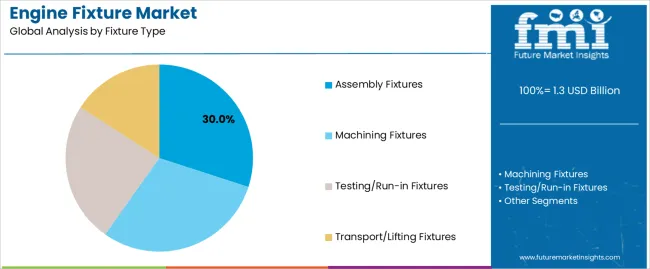
Market Position: Assembly fixtures command the leading position in the Engine Fixture market with 30% market share through comprehensive positioning capabilities, including multi-axis clamping control, modular reconfiguration features, and production line integration that enable manufacturers to achieve optimal assembly accuracy across diverse light vehicle and commercial vehicle production environments.
Value Drivers: The segment benefits from manufacturer preference for versatile fixture systems that provide consistent part positioning, reduced assembly cycle time, and quality improvement without requiring extensive line modifications. Advanced fixture features enable robotic integration, inline measurement systems, and compatibility with existing production equipment, where positioning repeatability and throughput efficiency represent critical operational requirements.
Competitive Advantages: Assembly fixtures differentiate through proven dimensional accuracy, modular design flexibility, and integration with automated manufacturing systems that enhance production effectiveness while maintaining optimal accessibility suitable for diverse engine assembly applications.
Key market characteristics:
Machining fixtures maintain significant positioning in the Engine Fixture market with 28% market share due to their precision holding properties and cutting force resistance advantages. These systems appeal to manufacturers requiring stable workpiece location with adequate rigidity for metal removal operations across engine block machining and cylinder head manufacturing applications. Market adoption is driven by CNC machining expansion, emphasizing dimensional accuracy and tool accessibility through optimized fixture configurations while maintaining competitive cost structures.
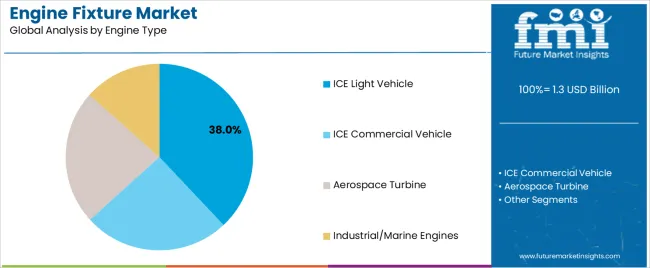
Market Context: ICE light vehicle applications dominate the engine fixture market with 38% market share due to widespread adoption of precision fixturing and increasing focus on assembly quality, production throughput, and defect minimization applications that reduce manufacturing errors while maintaining automotive industry standards.
Appeal Factors: Light vehicle manufacturers prioritize fixturing reliability, positional consistency, and integration with existing assembly line infrastructure that enables coordinated fixture deployment across multiple production stations. The segment benefits from substantial automotive manufacturing investment and quality improvement programs that emphasize the acquisition of precision fixtures for dimensional control and production efficiency applications.
Growth Drivers: Electric vehicle transition programs incorporate engine fixtures as standard tooling for powertrain component assembly, while global vehicle production expansion increases demand for high-volume fixturing capabilities that comply with automotive quality standards and minimize production downtime.
Market Challenges: Varying vehicle platform architectures and powertrain design differences may limit fixture standardization across different assembly facilities or production programs.
Application dynamics include:
ICE commercial vehicle applications capture 24% market share through specialized fixturing requirements in heavy-duty engine manufacturing, diesel powertrain assembly, and industrial vehicle production applications. These facilities demand robust fixture systems capable of handling larger component weights while providing adequate accessibility for assembly operations.
Aerospace turbine applications account for 22% market share, driven by ultraprecision requirements in jet engine manufacturing and turbine blade assembly, while industrial/marine engines capture 16% market share including stationary power generation, marine propulsion, and heavy equipment applications requiring specialized fixture capabilities for diverse engine architectures.
Market Position: Hydraulic actuation systems command the leading position with 36% market share through superior force generation capabilities, precise clamping control, and heavy-duty application suitability that enable manufacturers to achieve optimal workpiece stability across commercial vehicle and aerospace turbine manufacturing environments.
Value Drivers: The segment benefits from manufacturer preference for high-force clamping systems that provide consistent holding pressure, vibration resistance during machining operations, and force monitoring integration supporting quality control requirements.
Key market characteristics:
Pneumatic actuation maintains 28% market share through economical operation, rapid actuation speed, and widespread air supply availability in manufacturing facilities, appealing to high-volume automotive applications requiring quick changeover capabilities.
Market Context: Automotive OEM applications dominate the Engine Fixture market with 40% market share due to large-scale production volumes, stringent quality requirements, and comprehensive assembly line integration needs that drive sustained fixture procurement across global vehicle manufacturing operations.
Appeal Factors: Automotive manufacturers prioritize fixturing standardization, production scalability, and supplier quality management systems that enable coordinated tooling deployment across multiple assembly plants and vehicle platforms.
Growth Drivers: New vehicle platform launches require extensive fixturing investments, while electric vehicle production expansion creates demand for specialized fixtures supporting novel powertrain architectures and assembly processes.
Market Challenges: Price pressure from automotive cost reduction initiatives may limit fixture complexity and feature content in high-volume production applications.
Application dynamics include:
Tier-1 and engine builder applications capture 30% market share through specialized engine assembly operations, component manufacturing facilities, and aftermarket remanufacturing applications requiring customized fixturing solutions and technical collaboration.
Aerospace OEM/MRO applications account for 20% market share driven by precision requirements in turbine engine production and maintenance operations, while industrial/marine customers capture 10% market share including power generation, marine propulsion, and off-highway equipment manufacturing requiring robust fixturing solutions.
Growth Accelerators: Manufacturing quality enhancement drives primary adoption as engine fixtures provide superior positional accuracy capabilities that enable automotive and aerospace manufacturers to meet stringent dimensional tolerances without excessive production costs, supporting lean manufacturing operations and zero-defect initiatives that require precise component assembly applications. Automotive production automation demand accelerates market expansion as vehicle manufacturers seek effective fixturing systems that minimize setup time while maintaining operational repeatability during high-volume assembly scenarios. Manufacturing investment spending increases worldwide, creating sustained demand for precision fixturing systems that complement robotic automation processes and provide quality improvement in competitive production environments.
Growth Inhibitors: Capital investment requirements vary across fixture complexity levels regarding the integration of hydraulic actuation systems and electro-mechanical controls, which may limit operational flexibility and market penetration in regions with constrained manufacturing budgets or cost-sensitive production operations. Technical performance limitations persist regarding changeover time requirements and setup complexity that may reduce effectiveness in high-mix manufacturing environments, affecting production flexibility and batch size optimization. Market fragmentation across multiple industry standards and proprietary fixture designs creates compatibility concerns between different suppliers and existing production infrastructure.
Market Evolution Patterns: Adoption accelerates in automotive and aerospace sectors where quality requirements justify fixture investment costs, with geographic concentration in developed manufacturing markets transitioning toward mainstream adoption in emerging economies driven by production capacity expansion and quality standard improvements. Technology development focuses on electro-mechanical actuation advancement, digital monitoring integration, and compatibility with Industry 4.0 platforms that optimize assembly precision and production effectiveness. The engine fixture market could face disruption if alternative clamping technologies or modular fixturing systems significantly reduce the deployment of traditional hydraulic fixtures in manufacturing applications, though hydraulic systems' proven reliability, force capacity, and precision control continue to make them preferred in heavy-duty production scenarios.
The Engine Fixture market demonstrates varied regional dynamics with Growth Leaders including China (5% CAGR) and Brazil (4.6% CAGR) driving expansion through automotive manufacturing capacity additions and industrial production programs. Steady Performers encompass United States (3.5% CAGR), United Kingdom (3.5% CAGR), and Germany (3.4% CAGR), benefiting from established manufacturing industries and production automation adoption. Mature Markets feature Japan (2.3% CAGR), where specialized precision manufacturing applications and aerospace fixture integration support consistent growth patterns.
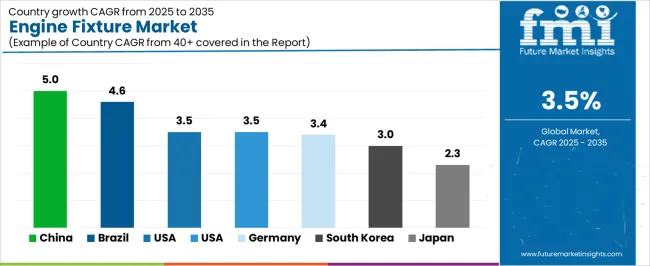
| Country | CAGR (2025-2035) |
|---|---|
| China | 5% |
| Brazil | 4.6% |
| United States | 3.5% |
| United Kingdom | 3.5% |
| Germany | 3.4% |
| South Korea | 3% |
| Japan | 2.3% |
Regional synthesis reveals Asia Pacific markets leading adoption through automotive production expansion and manufacturing capability development, while European countries maintain steady growth supported by aerospace manufacturing advancement and Industry 4.0 integration requirements. North American markets show moderate expansion driven by automotive retooling applications and aerospace production capacity increases.
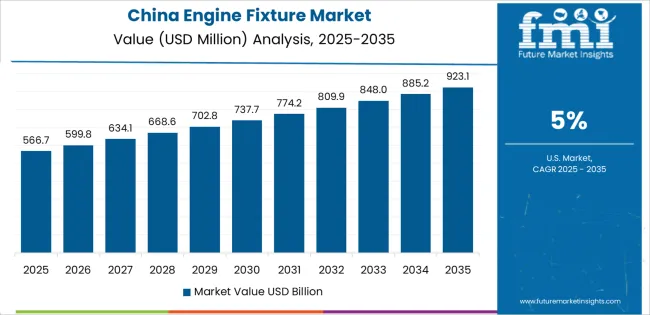
The Chinese market emphasizes advanced fixturing features, including automated clamping control and integration with comprehensive production monitoring platforms that manage assembly quality, dimensional verification, and defect tracking applications through unified manufacturing systems. The country demonstrates strong growth at 5% CAGR, driven by automotive manufacturing expansion, electric vehicle production initiatives, and emerging domestic engine manufacturing capabilities that support fixture integration. Chinese vehicle manufacturers prioritize operational effectiveness with engine fixtures delivering consistent assembly accuracy through advanced positioning capabilities and production automation features.
Technology deployment channels include major automotive OEMs, specialized fixture manufacturers, and manufacturing equipment suppliers that support professional applications for complex powertrain assembly and component machining applications. Production line integration capabilities with established automotive systems expand market appeal across diverse operational requirements seeking precision improvement and quality enhancement. The expanding automotive production base and accelerating EV manufacturing create sustained demand, while innovative applications in commercial vehicle production and aerospace component manufacturing open new growth avenues.
Performance Metrics:
Germany's advanced manufacturing market demonstrates sophisticated fixture deployment with documented operational effectiveness in automotive assembly applications and aerospace production facilities through integration with existing machining systems and quality control infrastructure. The country leverages engineering expertise in precision manufacturing and automation systems integration to maintain strong growth at 3.4% CAGR. Industrial centers, including Stuttgart, Munich, and Wolfsburg, showcase premium installations where fixture systems integrate with comprehensive production platforms and quality management systems to optimize manufacturing efficiency and dimensional accuracy.
German manufacturers prioritize system precision and Industry 4.0 compliance in fixture development, creating demand for advanced fixturing systems with integrated features, including force monitoring and digital process control. The engine fixture market benefits from established automotive infrastructure and willingness to invest in manufacturing technologies that provide long-term quality benefits and compliance with international automotive standards.
Market Intelligence Brief:
The USA engine fixture market demonstrates sophisticated deployment across automotive applications with documented effectiveness in light vehicle manufacturing and aerospace turbine production facilities through integration with comprehensive assembly automation systems and quality monitoring infrastructure. The country leverages advanced manufacturing capabilities in production engineering and automation technologies to maintain moderate growth at 3.5% CAGR. Industrial centers, including Detroit, Chicago, and Los Angeles, showcase established installations where fixture systems integrate with comprehensive manufacturing platforms and supply chain networks to optimize production throughput and assembly quality.
American manufacturers prioritize fixture flexibility and production efficiency in system development, creating demand for adaptable fixturing solutions with advanced features, including quick-change capabilities and digital monitoring integration. The engine fixture market benefits from established automotive manufacturing infrastructure and willingness to invest in production technologies that provide long-term efficiency benefits and compliance with automotive quality standards.
Market Intelligence Brief:
The UK engine fixture market demonstrates advanced manufacturing deployment with documented operational effectiveness in automotive production applications and aerospace engine facilities through integration with existing quality management systems and production infrastructure. The country leverages engineering expertise in precision manufacturing and automation systems integration to maintain steady growth at 3.5% CAGR. Industrial centers, including Birmingham, Derby, and Bristol, showcase specialized installations where fixture systems integrate with comprehensive quality platforms and aerospace certification programs to optimize manufacturing compliance and production accuracy.
British manufacturers prioritize system reliability and certification compliance in fixture development, creating demand for certified fixturing systems with advanced features, including traceability integration and quality documentation capabilities. The engine fixture market benefits from established aerospace manufacturing infrastructure and commitment to invest in production technologies that provide long-term quality benefits and compliance with aerospace industry standards.
Strategic Market Indicators:
Brazil's engine fixture market demonstrates expansion deployment with documented operational effectiveness in automotive manufacturing applications and commercial vehicle production facilities through integration with emerging manufacturing systems and quality improvement infrastructure. The country leverages growing industrial capabilities in automotive production and manufacturing systems integration to achieve high growth at 4.6% CAGR. Industrial centers, including São Paulo, Curitiba, and Porto Alegre, showcase expanding installations where fixture systems integrate with automotive assembly platforms and production networks to optimize manufacturing capacity and quality standards.
Brazilian manufacturers prioritize cost effectiveness and production volume in fixture development, creating demand for reliable fixturing systems with practical features, including durability and maintenance simplicity. The engine fixture market benefits from expanding automotive manufacturing infrastructure and willingness to invest in production technologies that provide production efficiency and compliance with automotive quality standards.
Market Intelligence Brief:
Japan's engine fixture market demonstrates precision deployment with documented operational effectiveness in automotive assembly applications and aerospace component production facilities through integration with advanced manufacturing systems and quality control infrastructure. The country leverages engineering excellence in precision manufacturing and automation systems integration to maintain steady growth at 2.3% CAGR. Industrial centers, including Tokyo, Nagoya, and Yokohama, showcase advanced installations where fixture systems integrate with comprehensive quality platforms and kaizen improvement systems to optimize production excellence and manufacturing precision.
Japanese manufacturers prioritize system precision and manufacturing excellence in fixture development, creating demand for ultraprecision fixturing systems with advanced features, including micron-level positioning and integrated measurement systems. The engine fixture market benefits from established automotive manufacturing infrastructure and commitment to invest in highest-quality production technologies that provide superior manufacturing precision and compliance with stringent Japanese quality standards.
Strategic Market Indicators:
South Korea's engine fixture market demonstrates advanced technology deployment with documented operational effectiveness in automotive manufacturing applications and commercial vehicle production facilities through integration with modern production systems and quality control infrastructure. The country leverages engineering capabilities in automotive manufacturing and automation systems integration to maintain moderate growth at 3% CAGR. Industrial centers, including Seoul, Ulsan, and Gwangju, showcase expanding installations where fixture systems integrate with comprehensive automotive platforms and production networks to optimize manufacturing efficiency and assembly accuracy.
Korean manufacturers prioritize production automation and quality improvement in fixture development, creating demand for advanced fixturing systems with integrated features, including automated clamping control and monitoring systems. The engine fixture market benefits from established automotive manufacturing infrastructure and willingness to invest in production technologies that provide operational efficiency and compliance with international automotive quality standards.
Strategic Market Indicators:
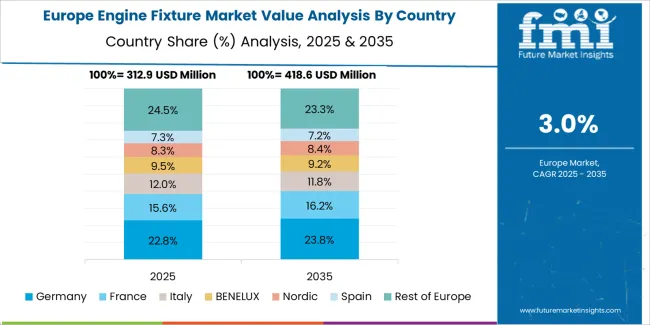
The Engine Fixture market in Europe is projected to grow substantially over the forecast period, with Germany expected to maintain its leadership position with significant market share supported by its advanced automotive manufacturing infrastructure and major production centers in Stuttgart, Munich, and Wolfsburg. France follows with strong market presence, driven by comprehensive automotive production programs and aerospace engine manufacturing initiatives.
The United Kingdom holds substantial market share through specialized aerospace manufacturing activities, precision engineering applications, and automotive component production. Italy commands notable market presence through automotive assembly operations and industrial engine manufacturing projects. Spain accounts for growing market share aided by automotive production expansion and commercial vehicle manufacturing adoption. The Netherlands maintains steady share driven by specialty manufacturing applications and logistics equipment demand. The Rest of Europe region is anticipated to show steady adoption, reflecting consistent growth in Nordic countries, manufacturing expansion in Central European markets, and production capacity upgrades across Eastern European automotive facilities.
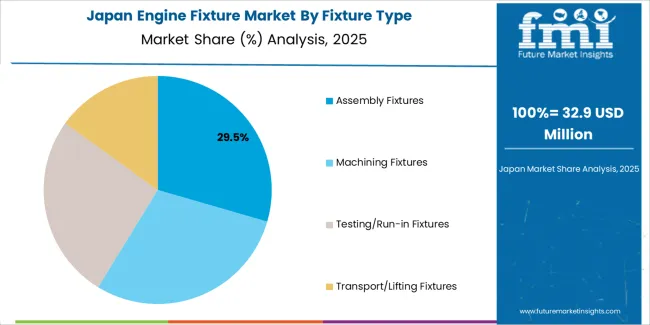
In Japan, the Engine Fixture market prioritizes hydraulic actuation systems, which capture the dominant share of automotive and aerospace installations due to their advanced features, including precise force control optimization and seamless integration with existing CNC machining infrastructure. Japanese manufacturers emphasize reliability, precision, and long-term operational consistency, creating demand for hydraulic fixtures that provide superior clamping capabilities and stable force characteristics based on manufacturing requirements and quality standards. Electro-mechanical systems maintain secondary positions primarily in light-duty assembly applications and automated production installations where comprehensive positioning functionality meets operational requirements without compromising production efficiency.
Market Characteristics:
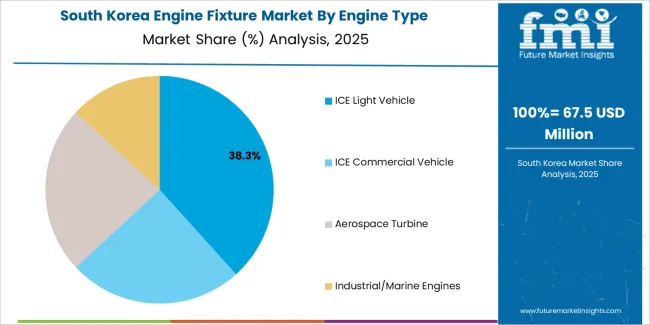
In South Korea, the engine fixture market structure favors international fixture manufacturers, including Haas Automation, CIMSYSTEMS, and Sandvik Coromant, which maintain dominant positions through comprehensive product portfolios and established automotive industry networks supporting both assembly fixture systems and machining fixture installations. These providers offer integrated solutions combining advanced fixturing hardware with professional engineering services and ongoing technical support that appeal to Korean automotive manufacturers seeking reliable precision positioning systems.
Local manufacturing equipment suppliers and tooling companies capture moderate market share by providing localized service capabilities and competitive pricing for standard automotive fixture installations, while domestic manufacturers focus on specialized applications and cost-effective solutions tailored to Korean manufacturing market characteristics.
Channel Insights:
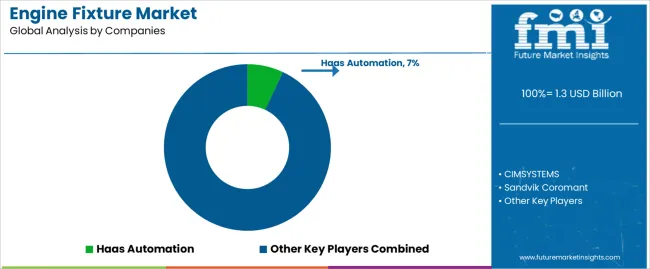
The Engine Fixture market operates with moderate concentration, featuring approximately 15-20 meaningful participants, where leading companies control roughly 35-40% of the global market share through established automotive industry relationships and comprehensive fixturing product portfolios. Competition emphasizes engineering precision, application expertise, and production integration capabilities rather than price-based rivalry. The leading company, Haas Automation, commands approximately 7% market share through its extensive fixturing product line and global manufacturing equipment presence.
Market Leaders encompass Haas Automation, CIMSYSTEMS, and Sandvik Coromant, which maintain competitive advantages through extensive fixturing engineering expertise, global automotive manufacturing networks, and comprehensive technical support capabilities that create customer loyalty and support premium positioning. These companies leverage decades of precision manufacturing experience and ongoing development investments to create advanced fixture systems with integrated monitoring capabilities and automation compatibility. Technology Innovators include SMW-AUTOBLOK, SCHUNK, and Carr Lane, which compete through specialized clamping technology focus and innovative actuation capabilities that appeal to manufacturers seeking advanced fixturing solutions and production optimization.
These companies differentiate through rapid application engineering cycles and specialized aerospace manufacturing focus. Regional Specialists feature fixture manufacturers concentrating on specific geographic markets and specialized applications, including modular fixture systems and custom engineering solutions. Market dynamics favor participants that combine proven positioning accuracy with advanced actuation capabilities, including force monitoring and digital integration features. Competitive pressure intensifies as traditional machine tool suppliers expand into integrated fixturing systems, while specialized automation companies challenge established players through robotic-compatible solutions and smart manufacturing platforms targeting automotive assembly and aerospace production segments.
| Item | Value |
|---|---|
| Quantitative Units | USD 1,250 million |
| Fixture Type | Assembly Fixtures, Machining Fixtures, Testing/Run-in Fixtures, Transport/Lifting Fixtures |
| Engine Type | ICE Light Vehicle, ICE Commercial Vehicle, Aerospace Turbine, Industrial/Marine Engines |
| Clamping/Actuation | Hydraulic, Pneumatic, Electro-Mechanical, Manual/Other |
| End Customer | Automotive OEM, Tier-1/Engine Builders, Aerospace OEM/MRO, Industrial/Marine |
| Regions Covered | Asia Pacific, Europe, North America, Latin America, Middle East & Africa |
| Countries Covered | China, India, Germany, United States, United Kingdom, Japan, South Korea, Brazil, and 20+ additional countries |
| Key Companies Profiled | Haas Automation, CIMSYSTEMS, Sandvik Coromant, SMW-AUTOBLOK, SCHUNK, Carr Lane, Jergens, Kitagawa, Forkardt, DESTACO |
| Additional Attributes | Dollar sales by fixture type, engine type, clamping/actuation, and end customer categories, regional adoption trends across Asia Pacific, Europe, and North America, competitive landscape with fixture manufacturers and automation suppliers, manufacturer preferences for precision and production integration, integration with automotive assembly platforms and quality monitoring systems, innovations in electro-mechanical actuation and digital monitoring, and development of modular fixturing solutions with enhanced performance and manufacturing optimization capabilities. |
The global engine fixture market is estimated to be valued at USD 1.3 billion in 2025.
The market size for the engine fixture market is projected to reach USD 1.8 billion by 2035.
The engine fixture market is expected to grow at a 3.5% CAGR between 2025 and 2035.
The key product types in engine fixture market are assembly fixtures, machining fixtures, testing/run-in fixtures and transport/lifting fixtures.
In terms of engine type, ice light vehicle segment to command 38.0% share in the engine fixture market in 2025.






Full Research Suite comprises of:
Market outlook & trends analysis
Interviews & case studies
Strategic recommendations
Vendor profiles & capabilities analysis
5-year forecasts
8 regions and 60+ country-level data splits
Market segment data splits
12 months of continuous data updates
DELIVERED AS:
PDF EXCEL ONLINE
Engine Piston Ring Set Market Size and Share Forecast Outlook 2025 to 2035
Engine Cylinder Liners Market Size and Share Forecast Outlook 2025 to 2035
Engineering Service Outsourcing Industry Analysis in North America Size and Share Forecast Outlook 2025 to 2035
Engine Fogging Oil Market Size and Share Forecast Outlook 2025 to 2035
Engine Valve Market Size and Share Forecast Outlook 2025 to 2035
Engine Starter Fluid Market Growth - Demand, Trends & Forecast 2025 to 2035
Engineering Service Outsourcing Market Analysis - Size, Share, & Forecast Outlook 2025 to 2035
Engineering Analytics Market Growth & Demand 2025 to 2035
Engineering Plastic Market Analysis - Size, Share & Forecast 2025 to 2035
Engineered Cell Therapy - Market Trends & Forecast 2025 to 2035
Engine Tuner Market - Growth & Demand 2025 to 2035
Engine Flush Market Growth – Trends & Forecast 2025-2035
Engine Actuators Market
Engine Mounting Brackets Market
Engineered Wood Market
Geoengineering Market Analysis – Size, Demand & Forecast 2025 to 2035
Aeroengine Accessory Drive Train Market Size and Share Forecast Outlook 2025 to 2035
Gas Engines Market Size and Share Forecast Outlook 2025 to 2035
Aero Engine Coatings Market Growth - Trends & Forecast 2025 to 2035
Civil Engineering Market Size and Share Forecast Outlook 2025 to 2035

Thank you!
You will receive an email from our Business Development Manager. Please be sure to check your SPAM/JUNK folder too.
Chat With
MaRIA